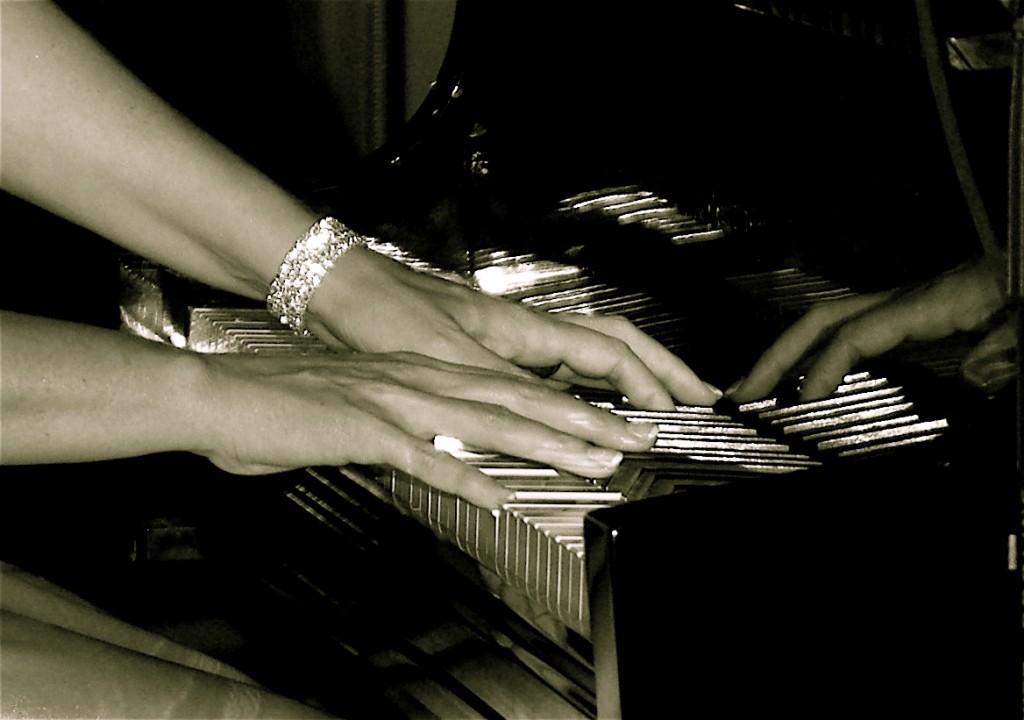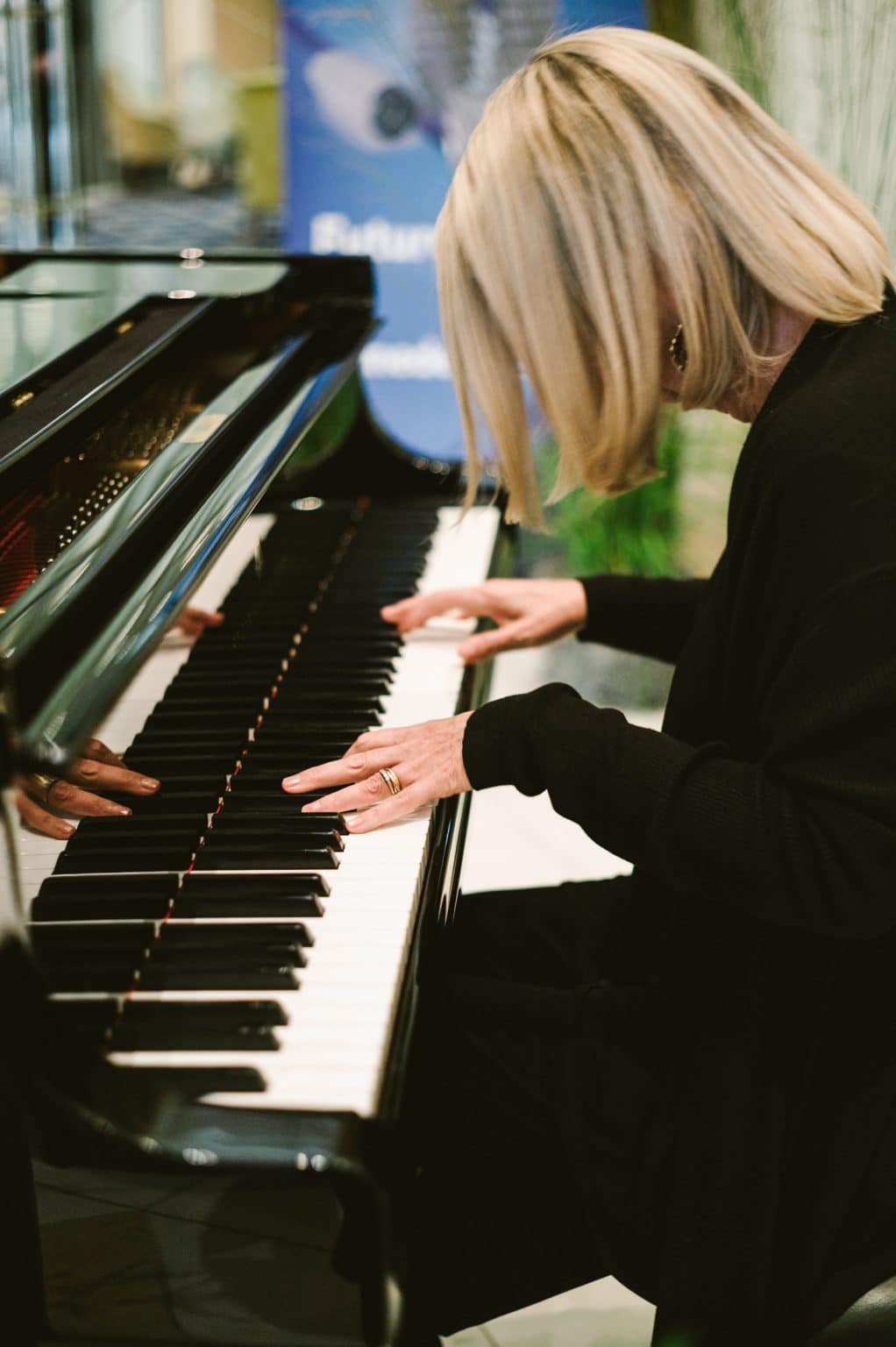It’s a Saturday night in June. I pull into the Schlosshotel Lerbach parking lot, ready to play my regular weekend piano job. Because of the World Cup football frenzy, I expect to find a half-empty castle. But since it’s the height of wedding season and there’s no stopping a determined summer bride, the hotel is buzzing with well-heeled guests all trying to have a good time, even if many of them would rather be home watching tonight’s match.
I’m not much of a sports fan, but—never one to miss an opportunity to look at grown men in Brazilian Boy Scout uniforms—I’ve been digging the various team outfits. The players look adorable in their multicolored tricots and matching knee socks, and the German coaches, in their lavender silk knit sweaters and perfectly tailored navy blazers, look as if they might be getting ready to play a jazz duo gig at a chichi supper club owned by Calvin Klein. Who’s their stylist? Sign me up.
I’ll be playing in the main hall tonight. With five minutes to go until my start time, I throw my purse into the back room, change my shoes, adjust the height of the piano bench, grab a glass of water, and head out to the rose garden to see what’s going on.
The bride has hired a solo saxophonist to play for her two-hour predinner cocktail party on the terrace. As much as I like the saxophone, I’m not sure that 120 minutes of solo sax is such a great idea. But I admire the bride’s resolve to present something a little different. I know the saxophonist, a spunky jazz musician named Thorsten, who’s blowing like crazy even though it’s boiling hot outside. Thorsten spots me in the doorway and salutes while continuing to play the sax with one hand. Cool guy. It’s a wedding gig, so no one is listening to him. Well, really, only about fifty percent of the guests are not listening to him. The other fifty percent have sneaked into the bar to watch the soccer game. Ghana is playing Uruguay tonight. This is a match that makes me wish all countries would adopt the American custom of marching bands at halftime. Imagine a Ghanaian marching band or a drill team from Uruguay. Swinging.
In the banquet room a DJ is setting up to play after-dinner dance music—probably a mix of Gloria Gaynor, Village People, and Donna Summer. I’ll be long gone by then, but my coworkers, the hardest-working bunch of young adults in Nordrhein-Westfalen, will be pouring and serving champagne until daybreak.
Time to start playing. I sit down at the grand piano in the lobby and begin my set with Mancini’s “Love Theme from Romeo and Juliet.” I try to block out the saxophone sound leaking from the garden. Not bad. I’ll be fine if I play loudly and don’t take too many dramatic pauses.
Boom!
Oh no. The DJ in the dining room is conducting a last-minute sound check, and Celine Dion’s voice blasts through the lobby and bounces off the walls. The DJ cranks it up. My God. Does he think this is a football stadium in Cape Town?
I believe your speakers are working, I want to shout. I wait for Celine to stop braying, but she keeps singing about how her heart is going on and on and on. I ask our intrepid banquet manager, Herr Ries, to put an end to the sound check before Ms. Dion can modulate to an even higher key and my brain explodes. I don’t know what Herr Ries does to the DJ—maybe he conks him on the head with an ice bucket—but the music stops abruptly. I continue with “Romeo and Juliet.”
The wedding guests float in and out of the lobby. I check out the blushing bride, the little boys in their starched white shirts, and the fresh-as-spring young ladies in their sorbet-colored evening gowns. One dress, a golden-vanilla strapless creation, makes me wonder if I should revamp my Piano Girl wardrobe, but to wear this dress I would need to lose fifteen pounds, have breast reduction surgery and a tummy tuck, and give up playing the piano. Better to stick with the German football coach wardrobe. It’s more my style these days.
I play Bach’s Air on a G-String. Bad title, but, really, it’s a lovely piece of music.

The service staff, smiling and carrying enormous trays of crystal glasses, glides through the lobby, bypassing clumps of guests and dodging the children who dash back and forth in a chocolate-induced race to the front door, where they will be given more chocolate before they streak back to the other side.
I play some music from The Wonderful World of Amelie. A sturdy woman in a lace mother-of-the-bride dress smiles at me. I wonder if she actually is the mother of the bride, or just a look-alike.
On top of the piano is a silver urn holding a cluster of eleven dark pink orchids. I know it’s eleven, because I count them. God, I love this place—beautiful colors, beautiful clothes, beautiful people. The large window over the staircase diffuses the light and directs it to the lobby, where it hangs in a soft golden stupor. The guests around me dash through the beams, unaware that, for a few moments this evening, they’ve been airbrushed by the setting sun.
Two men, on their way into the bar to check on Ghana’s progress, stop a waitress and ask if they can exchange their champagne for beer.
Four preteen boys discover the antique kicker table in the corner of the lobby. It’s a low-tech toy with little hand-operated soccer men. Four players can play at once, two on each side. It’s hardly an attraction for a five-star hotel, but this table, made of burled wood and featuring hand-painted players, is more of a hip World Cup art statement than a recreational device.
Klak, klak, klak, klak, klak.
The boys have gathered around the table, and the sound of the little wooden men kicking the ball echoes through the lobby, along with the shouts and cheers of the kids. They’re cute for about three and a half minutes, at which point the noise reaches an almost unbearable level. Where are their parents?
Klak, klak, klak, klak, klak.
I’m playing “Moon River.”
“TOR!!!!” one of the boys shouts.
I can hear Thorsten playing a blues in a key that clashes with my song.
Klak, klak, klak, klak, klak.
The DJ cranks up Celine again. Her heart is still going on.
“TOR!!!!” the boys yell again.
Monsieur Thomann, the maître d’ of the gourmet restaurant on one side of the lobby, peeks through the French doors. He smiles at the boys. Monsieur, the poster child for graciousness, always keeps his temper in check when he’s around the guests. He’s particularly kind to children.
“Bonsoir!” he says to the boys.
“TOR!!!” they scream.
“Mon Dieu,” says Monsieur.
Klak, klak, klak, klak, klak.
I give up. I do not blame the boys. They are eleven. In two years they’ll be sullen and subdued and doing everything they can to look like gangsters. Let them have their fun. I go to the bar, sip a glass of very nice champagne, watch Ghana score a goal, and thank my lucky stars that I have a job. It’s usually so peaceful in this place. One night of extreme noise never hurt anyone, least of all a musician.
***
Fifteen minutes later I slip behind the grand piano to begin my second set. The lobby is blissfully quiet. I can see from the piano bench that most of our guests have been seated in their respective dining rooms. Thorsten has finished playing his two-hour saxophone extravaganza, Ghana has won the match and the television has been turned off, the DJ is eating an expensive dinner until it’s time for the Titans of Industry disco contest to begin, and the kicker boys have gone to the lake to feed the swans. Monsieur assures me that the kicker ball has mysteriously disappeared for the remainder of the evening.
I play through a selection of original music, songs I like to break out when there’s no one listening except me. They are pretty songs from my younger years, with girly-girl names like “Twilight” and “Peaceful Harbor.” I close my eyes and play and play and play. I pretend like I’m somewhere else. It’s what I know how to do.
Zoom, zoom.
I look up and see a vehicle the size of the Popemobile rumbling through the lobby. Maybe it is the Popemobile; this castle is known for celebrity sightings. Oh no. It’s an extremely large electric wheelchair driven by a very assertive-looking middle-aged man. Like most good hotels in Germany, Lerbach accommodates disabled guests, but this is no regular wheelchair—it’s huge. The man, who is quite tall, is standing in the vehicle, making it less of a chair and more of a slanted bed with wheels, straps, and a motor. His feet are about at my eye level; the rest of him towers over everything else in the lobby.
I’m playing a piece of mine called “Lerbach Nocturne.” I try not to stare at Wheelchair Guy, but I guess if he’s riding around in a Popemobile he’s used to people gawking at him. A couple of stares from a curious pianist surely won’t send him off the deep end. I’m usually good at being discreet, so I avert my eyes and continue playing. But I can’t stop looking. I’m stunned by the size of this contraption. Several concerned adults chase after him, but they have trouble keeping up.
Yikes! He almost took out one of the banquet waiters on that last turn.
Zoom, zoom.
I decide that when he passes the piano I will greet him cheerfully, the same way I greet all of our other guests, even though most of our other guests are not riding through the lobby in wheelchairs the size of Hummers. Some of them own Hummers, but they usually keep them in the parking lot next to the smaller cars.
Did he just run over that woman’s foot?
Zoom.
Monsieur, who will be seating Wheelchair Guy and his family in the restaurant, stops in his tracks when he sees the size of the vehicle. He smiles, welcomes the guests, then spins on his heels to begin rearranging the restaurant furniture. It’s a challenge: a party of four that needs space for sixteen, arriving right in the middle of a sold-out Saturday night.
“Did they call in advance?” I ask one of my coworkers as she passes by the piano.
“Yes,” she says. “But they said they were bringing a wheelchair, not a tractor with a hydraulic lift system. The poor guy has to eat standing up. He can’t bend. At all.”
“Oh no,” I say. Words fail me. Now the size of the vehicle makes sense.
I’m still playing “Lerbach Nocturne.”
“We would like to have drinks on the terrace,” says a member of Wheelchair Guy’s party. “So we can enjoy the view.”
“I would suggest you have cocktails here in the lobby,” says one of the managers. “There’s indeed a beautiful view of the park from the bar terrace, but there are steps onto the terrace, so you won’t be able to get outside from this direction.”
Unless you have a crane, I think. It makes me sad. What a thing—a view that remains invisible because of a few steps. Just as Monsieur turns to talk to the other members of the party, Wheelchair Guy, with what I perceive as a look of defiance—he’s so high up I can’t see him all that well—steps on the gas and speeds into the bar.
“Good evening,” I say as he flies past the piano.
Behind me, I hear a tray of glasses crash to the floor. Then I hear another voice—maybe the bartender’s—patiently explain that this part of terrace is not wheelchair accessible. There’s no room for a three-point turn in the bar, so Wheelchair Guy, pissed off, backs up at about eighty miles an hour.
Zoom.
It’s as if he’s being shot out of a cannon backwards. The Popemobile whips into the lobby and crashes into the grand piano so hard that it lurches sideways and pins me to the wall.
“Mon Dieu!” says Monsieur.
“Help,” I say. The piano is jammed against my upper thigh (thank goodness for fat). My upper arms and elbows are flush against the wall, and my wrists and hands are flapping like little birds in the air over the keys.
I reach down with the tips of my fingers and play the final chords, because, well, I have to end the song. The piano is wobbling and Wheelchair Guy doesn’t realize that his Popemobile fender is hooked onto the underside of the piano lid. He jams his shift stick to forward, then reverse, then forward, then reverse. The piano rocks back and forth, and I am certain it is going to crash to the ground, taking me, Wheelchair Guy, Monsieur, and six waiters with it.
“Straight ahead, drive straight ahead, s’il vous plait,” says Monsieur to Wheelchair Guy in a firm but pleasant voice. “Straight ahead! Straight ahead!”
“Robin, don’t move,” says one of the managers. Like I have a choice.
Zoom. Reverse. Zoom. Reverse.
Fuck, fuck, fuck, fuck, fuck.
“Straight ahead!” says Monsieur. “S’il vous plait!”
Wheelchair Guy looks down at me. I look up at him. Neither one of us much likes what we see.
Finally, like a desperate mother lifting a Volkswagen off the legs of a trapped child, Monsieur lifts the piano enough to unhinge the Popemobile. It races forward and nearly collides with the tea cart. For a moment I think I’ve escaped having my legs crushed by a grand piano only to be hit with the world’s largest samovar, which is, of course, full of boiling water. But Wheelchair Guy misses the tea cart. Instead, he zigzags to the entrance of the restaurant, followed by the newly appointed Popemobile Task Force, a group of employees designated to prevent more castle damage. A lot can go wrong in a gourmet restaurant, especially when a disgruntled disabled man with a Hells Angels mentality starts zooming around during the soup course.
I am still pinned to the wall. A member of Wheelchair Guy’s entourage, a lovely young woman in a perfect black dress, returns to the piano.
“Has the piano been harmed?” she asks, avoiding my eyes.
“I don’t know,” I squeak. “I’ll have to unpin myself before I can check out the damage.” I wonder why she doesn’t ask me if I’m injured. But she hangs out with Wheelchair Guy. Maybe a pianist with a bruised thigh isn’t such a big deal.
I heave the piano forward enough to slide out from behind, and limp around to the other side. Amazingly, only a small chunk of wood is missing. The legs are stable. I’ve always claimed this Yamaha Conservatory Grand is a warhorse; now I know it’s true. I wonder if the Popemobile has a dent, a ding, or at least a couple of good battle scars.
A bridesmaid approaches the piano. “Can you tell me where the ladies’ room is?” she asks.
“Downstairs,” I say.
“Oh! Are you the piano lady? Can you play the theme from Titanic for me?”
“Actually, I’ve finished playing for this evening,” I say. I rub my leg. It hurts.
“But you can’t stop! I just got here.”
“Okay,” I say. “I’ll be glad to play Titanic for you.” I sit back down at the piano, start the piece, and she leaves to go to the ladies’ room.
That’s enough music for me tonight. I leave the castle through the bar exit, step onto the terrace, and take in the lush June evening. The trees droop in the weighty heat, but the roses seem plump and content. I walk down a stone staircase to the little lake, where a determined black swan paddles to the other side. Determined. We’re all so determined—to have fun, to win the game, to make music, to look good, to get where we want to go.
In the distance I can hear the thump, thump, thump of the DJ’s stadium-sized bass speakers. I wonder if the wedding guests are already gearing up for the Electric Slide or the YMCA dance. I wonder if they’re celebrating in Ghana. I wonder if Wheelchair Guy is enjoying his gourmet meal, and if the other guests in the dining room are succeeding in their efforts to not stare at him. I wonder if those little boys are now at the front desk, begging the manager to give them another ball. I wonder if Wheelchair Guy ever kicked a soccer ball or played a piano or ate a dinner while sitting in a normal chair. I wonder if he ever danced, or paddled across a pond, or held a glass of champagne.
I skip a stone over the dark green pond and watch each ripple dissolve into the next. When the surface becomes calm again, I look down and see my watery reflection.
Then, because I can, I walk away.

Robin Meloy Goldsby is a Steinway Artist. She is also the author of Piano Girl; Waltz of the Asparagus People: The Further Adventures of Piano Girl; and Rhythm: A Novel.
Coming soon: Manhattan Road Trip, a collection of short stories about (what else?) musicians.
Sign up here to receive Robin’s monthly newsletter. A new essay every month!
